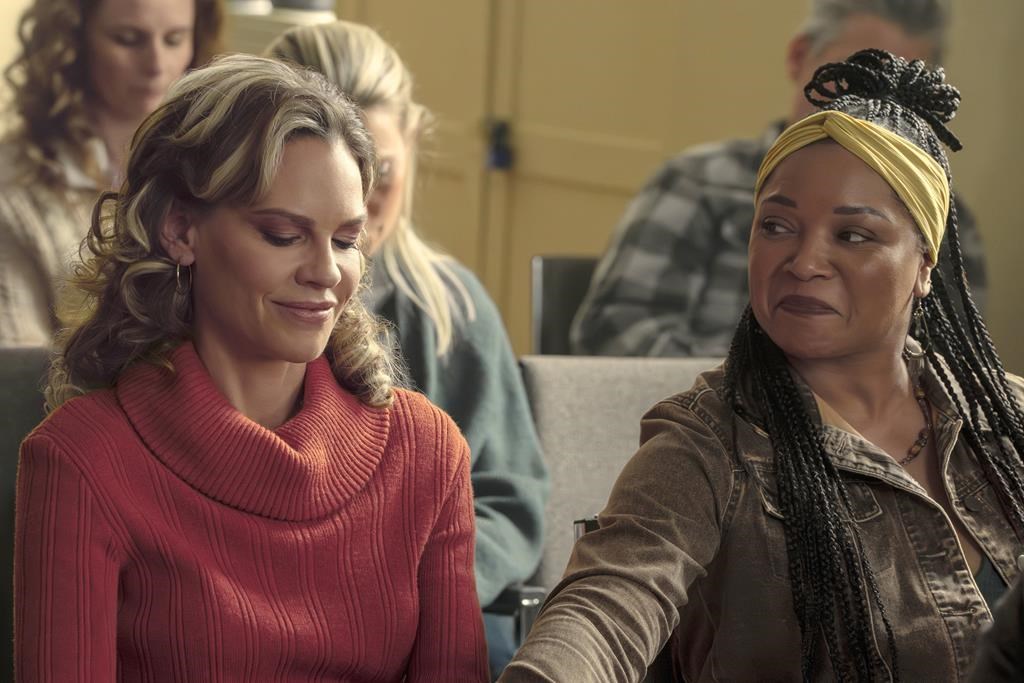Movie Review: Hillary Swank gives inspirational ‘Ordinary Angels’ both the heart and heft it needs

At the end of “Ordinary Angels,” we’re given one of those now-see-how-it-really-happened moments with real footage mirroring the climax of the film. That’s a really good thing.
Because otherwise, one might be tempted to think the filmmakers had dreamed up a story too sappy and inspirational to be true. But no, this tale of how one determined woman rallied her community to help save a dying young girl took place largely as it’s presented.
Despite the compelling source material, “Ordinary Angels” is one of those movies where you can predict developments with certainty. You know in your bones when the phone’s about to ring with a fateful call. You know when a character is finally going to lose patience, telegraphing the obligatory Moment of Conflict. And you know when an alcoholic is going to relapse, even before the shot of the beers in the fridge.
Advertisement
Such predictability can be fatal for a film, but “Ordinary Angels,” directed by Jon Gunn, has something crucial going for it — Hilary Swank. Not for nothing, we soon recall, has Swank won two Oscars. With her innate groundedness — even in big hair, fringed jacket, sparkly dress and pink heels — she can lend truth to most any scenario. She gives what could have been merely a pass-the -Kleenex weepie its heart, yes, but more importantly its heft.
First, though, we meet Ed, a Kentucky roofer ( Alan Ritchson, solid and appealing). In flashback, Ed welcomes his second daughter at the hospital with his wife, and the loving couple name her Michelle. Flash forward five years, though, and Ed’s wife is dying of a congenital disease. A devastated Ed promises to take care of the girls.
Now we meet Sharon (Swank), a single hairdresser with an estranged son. She’s also what they call hard-living, which means we meet her at — where else? — a bar, where she dances on the counter and does shots and falls down and ends up a mascara-stained mess. Her wise friend Rose — there’s always a wise friend — forces her to an AA meeting, but Sharon still won’t call herself an alcoholic.
But she does hear some good advice at the meeting, where a man describes learning to “find a reason to be here that’s bigger than you are.”
Like clockwork, Sharon sees an article in the local paper about a 5-year-old girl — Ed’s daughter Michelle — whose mother has just died and who now needs a liver transplant. Sharon shows up at the funeral unannounced, then tells Rose back at the salon that she thinks her destiny is to find the money for the transplant.
Advertisement
But meanwhile, there are huge hospital bills, and Ed can’t afford them. Without asking, Sharon holds a fundraiser and shows up at the house with several thousand dollars in cash. Ed is, understandably, perplexed at this woman who is soon eating dinner with the family. But his mother, Barbara, welcomes Sharon with open arms. “Mom, she’s a mess,” Ed says. “Perfect, she’ll fit right in here,” Barbara replies.
Certainly they need money. For one hospital stay, Ed, who has no health insurance, is charged more than $6,000 (the scene is an advertisement for socialized medicine). Soon Sharon is sitting down with Ed and going through all his bills, making piles of “urgent” and “very urgent.” (“Daddy’s in over his head,” says older daughter Ashley.) Sharon also helps Ed market his roofing skills.
But Sharon is struggling in her own life. Her estranged son, embittered by her alcoholism during his childhood, rejects her efforts to reconcile. Sharon’s words to him, even uttered by the always-authentic Swank, are trite: “I know I let you down,” she says. “Being a single mom ain’t easy.” The by-the-numbers script also leaves us wondering when, a full hour into the movie, Ed asks Sharon about her past: “Married? Kids?” You’d think that would have come up many moons ago, but OK.
Things go back and forth between Ed and Sharon, who may be an angel but lacks boundaries. She pretends to be his sister to call and find out what he owes the hospital. But later, she convinces a group of hospital executives to erase hundreds of thousands of dollars in debt. Ed is moved to tears, but then Sharon goes too far, angering him when she calls a news crew to the home without permission.
Sharon suffers a predictable relapse with alcohol, but then the stakes are raised dramatically for the denouement of the story. A new liver for Michelle is in reach, but the family needs a private plane to get there — during the famous Kentucky Blizzard of 1994, the worst in state history. Sharon needs more miracles and the whole town needs to help.
Advertisement
Again, this would all seem made up if it didn’t actually happen. We won’t spoil the ending, but this is an inspirational tale, so you can count on being inspired. Luckily Swank is on hand, almost singlehandedly raising the material to a level that keeps you wanting to watch. And sometimes, for a good cry at the movies, that’s really all you need.
“Ordinary Angels,” a Lionsgate release, has been rated PG by the Motion Picture Association of America “for thematic content, brief bloody images and smoking.“ Running time: 116 minutes. Two and a half stars out of four.
Jocelyn Noveck, The Associated Press